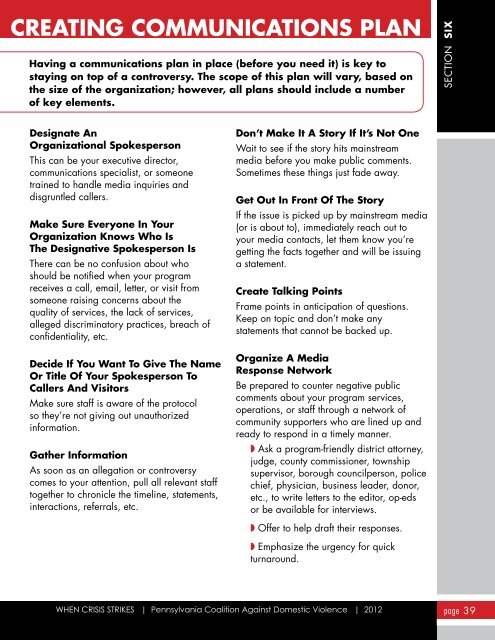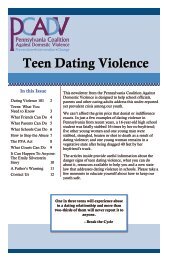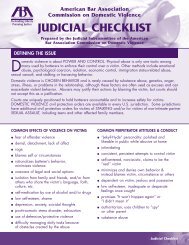Toolkit with Report Form - Pennsylvania Coalition Against Domestic ...
Toolkit with Report Form - Pennsylvania Coalition Against Domestic ...
Toolkit with Report Form - Pennsylvania Coalition Against Domestic ...
You also want an ePaper? Increase the reach of your titles
YUMPU automatically turns print PDFs into web optimized ePapers that Google loves.
Creating Communications Plan<br />
Having a communications plan in place (before you need it) is key to<br />
staying on top of a controversy. The scope of this plan will vary, based on<br />
the size of the organization; however, all plans should include a number<br />
of key elements.<br />
Section Six<br />
Designate An<br />
Organizational Spokesperson<br />
This can be your executive director,<br />
communications specialist, or someone<br />
trained to handle media inquiries and<br />
disgruntled callers.<br />
Make Sure Everyone In Your<br />
Organization Knows Who Is<br />
The Designative Spokesperson Is<br />
There can be no confusion about who<br />
should be notified when your program<br />
receives a call, email, letter, or visit from<br />
someone raising concerns about the<br />
quality of services, the lack of services,<br />
alleged discriminatory practices, breach of<br />
confidentiality, etc.<br />
Decide If You Want To Give The Name<br />
Or Title Of Your Spokesperson To<br />
Callers And Visitors<br />
Make sure staff is aware of the protocol<br />
so they’re not giving out unauthorized<br />
information.<br />
Gather Information<br />
As soon as an allegation or controversy<br />
comes to your attention, pull all relevant staff<br />
together to chronicle the timeline, statements,<br />
interactions, referrals, etc.<br />
Don’t Make It A Story If It’s Not One<br />
Wait to see if the story hits mainstream<br />
media before you make public comments.<br />
Sometimes these things just fade away.<br />
Get Out In Front Of The Story<br />
If the issue is picked up by mainstream media<br />
(or is about to), immediately reach out to<br />
your media contacts, let them know you’re<br />
getting the facts together and will be issuing<br />
a statement.<br />
Create Talking Points<br />
Frame points in anticipation of questions.<br />
Keep on topic and don’t make any<br />
statements that cannot be backed up.<br />
Organize A Media<br />
Response Network<br />
Be prepared to counter negative public<br />
comments about your program services,<br />
operations, or staff through a network of<br />
community supporters who are lined up and<br />
ready to respond in a timely manner.<br />
◗ Ask a program-friendly district attorney,<br />
judge, county commissioner, township<br />
supervisor, borough councilperson, police<br />
chief, physician, business leader, donor,<br />
etc., to write letters to the editor, op-eds<br />
or be available for interviews.<br />
◗ Offer to help draft their responses.<br />
◗ Emphasize the urgency for quick<br />
turnaround.<br />
When Crisis Strikes | <strong>Pennsylvania</strong> <strong>Coalition</strong> <strong>Against</strong> <strong>Domestic</strong> Violence | 2012<br />
page 39








